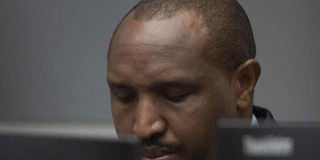Congolese 'Terminator' warlord Bosco Ntaganda gets 30 years in prison

The former Congolese militia leader Bosco "Terminator" Ntaganda looks on in the courtroom of the International Criminal Court in The Hague, on November 7, 2019, prior to the verdict. PHOTO | PETER DEJONG | AFP
What you need to know:
- Bosco Ntaganda faced life in prison for a litany of crimes including directing massacres of civilians in Democratic Republic of Congo's volatile, mineral-rich Ituri region in 2002 and 2003.
- A statement from the ICC said the time Ntaganda has spent in detention at the ICC - from March 22, 2013 to November 7- will be deducted from this sentence.
- It said that considering the nature and gravity of the crimes and the warlord's solvency, a fine or forfeiture of proceeds in addition to imprisonment was considered inappropriate.
THE HAGUE,
International Criminal Court Judges on Thursday sentenced Congolese rebel chief Bosco "Terminator" Ntaganda to 30 years in prison after he was convicted earlier this year of war crimes and sexual slavery.
Ntaganda faced life in prison for a litany of crimes including directing massacres of civilians in Democratic Republic of Congo's volatile, mineral-rich Ituri region in 2002 and 2003.
He became the first person to be found guilty of sexual slavery when he was convicted by The Hague-based ICC in July. In total he was convicted on 13 counts of war crimes and five of crimes against humanity.
A statement from the ICC said the time Ntaganda has spent in detention at the ICC - from March 22, 2013 to November 7- will be deducted from this sentence.
"The Chamber considered the gravity of the crimes and the degree of harm caused by each crime as well as Mr Ntaganda’s culpability, namely his level of intent and degree of participation," the ICC said.
"The Chamber also considered potentially mitigating circumstances but found them either not to be established or considered the weight accorded to be too limited to impact on the individual and overall sentences."
It said that considering the nature and gravity of the crimes and the warlord's solvency, a fine or forfeiture of proceeds in addition to imprisonment was considered inappropriate.
SURRENDER
The Rwandan-born 46-year-old has appealed against his conviction.
"Judges may impose an imprisonment sentence of maximum 30 years or life imprisonment when justified by the extreme gravity of the crime," the ICC said in a statement announcing his sentencing.
The ICC judges heard separately from victims and witnesses in September to help them decide on the sentence.
The first-ever suspect to voluntarily surrender to the ICC, Ntaganda walked into the US embassy in the Rwandan capital Kigali in 2013 and asked to be sent to the court in the Netherlands.
During his trial Ntaganda was portrayed as the ruthless leader of ethnic Tutsi revolts amid the wars that convulsed the DRC after the 1994 genocide of Tutsis in neighbouring Rwanda.
Judges found that Ntaganda was a "key leader" in terms of planning and operations for the Union of Congolese Patriots rebel group and its military wing, the Patriotic Forces for the Liberation of Congo (FPLC).
Fighters loyal to him carried out atrocities such as a massacre in a banana field behind a village in which at least 49 people including children and babies were disembowelled or had their heads smashed in.
SEXUAL SLAVERY
Ntaganda was also responsible for the rape and sexual slavery of underage girls, and of recruiting troops under the age of 15.
More than 60,000 people have been killed since the violence erupted in Ituri region in 1999 according to rights groups, as militias battle each other for control of scarce mineral resources.
Ntaganda -- known for his pencil moustache and a penchant for fine dining -- told judges during his trial that he was "soldier not a criminal" and that the "Terminator" nickname did not apply to him.
After the Ituri conflict, Ntaganda was integrated into the Congolese army and was a general from 2007 to 2012, but then became a founding member of the M23 rebel group in a new uprising against the government.
Prosecutors said his decision to hand himself in to the ICC that year was based on self-preservation as he was in danger because of a feud in the group.
OTHER CASES
Ntaganda is one of five Congolese warlords to have been brought before the ICC, which was set up in 2002 as an independent international body to prosecute those accused of the world's worst crimes.
Ntaganda's former FPLC commander Thomas Lubanga was sentenced to 14 years in jail in 2012.
But the ICC has suffered a string of setbacks over recent years with some of its most high-profile suspects walking free, including Ivorian former leader Laurent Gbagbo earlier this year.
It has also been criticised for mainly trying African suspects so far.






